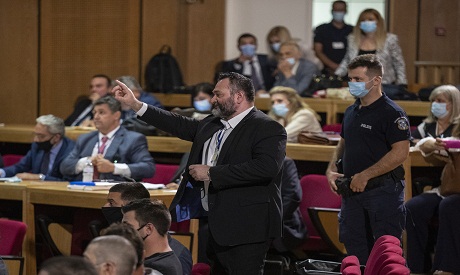
European Parliament member Ioannis Lagos, who had been found guilty along with others of leading a criminal organization and face five to 15 years in prison, talks in a court session on his sentencing in Athens, Monday, Oct. 12, 2020. AP
A Greek court Monday rejected calls for leniency for the leaders of notorious Greek neo-Nazi party Golden Dawn, paving the way for sentences of up to 15 years after a five-year trial.
The court refused lawyers' requests to consider mitigating factors when sentencing party founder and long-term leader Nikos Michaloliakos and six other former party lawmakers.
They were convicted last week of crimes that include running a criminal organisation.
The latest decision came on the 76th anniversary of Greece's liberation from Axis occupation in World War II.
The announcement of the sentencing that had been expected Tuesday was expected to be delayed after one of the defendants -- independent Eurodeputy Ioannis Lagos -- asked that the court be recused for 'bias'.
However, goverment spokesman Stelios Petsas later told reporters that "the court will pronounce the sentences in a few hours."
Dozens of Communist protesters gathered outside the court near central Athens on Monday, demanding harsh sentences for the "Nazi criminals".
After over five years of hearings, the panel of three judges on Wednesday unanimously labelled the paramilitary party a criminal organisation in the trial described as one of the most important in Greece's political history.
Over 50 convicted
More than 50 defendants were convicted of crimes ranging from running a criminal organisation, murder and assault to illegal weapons possession.
As a result, Michaloliakos and six others including Lagos, deputy leader Christos Pappas and former party spokesman Ilias Kassidiaris will receive sentences of up to 15 years, a court source said.
Key crimes carried out by Golden Dawn are the 2013 murder of anti-fascist rapper Pavlos Fyssas and the beating of Egyptian fishermen in 2012 and communist trade unionists in 2013, the court established on Wednesday.
The announcement was greeted with elation by some 20,000 anti-fascist protesters gathered outside.
Some of them later briefly clashed with riot police.
Police over the weekend blocked plans by Lagos to hold a demonstration outside the tribunal on Monday.
'Scared little people'
Lagos, a top Golden Dawn organiser who defected from the party last year after his election to the European parliament, last week said he was convicted by a "scared team of little people carrying out orders and trampling on every sense of law."
"You don't scare me," he tweeted.
Lagos' lawyer Constantinos Plevris -- a known Nazi sympathiser and author of an anti-Semitic book -- on Monday said the verdict had been swayed by the size of the anti-fascist protest.
"I feel like I'm in a French Revolution tribunal," he told the court, referring to the crowd outside. "Ideology is not on trial."
Lagos caused controversy in January by ripping up a printout of the Turkish flag in the European parliament, arguing that Turkey was to blame for illegal migration flows into Greece.
Michaloliakos has rejected his conviction as a political witchhunt.
"We were condemned over our ideas," he tweeted last week. "When illegal immigrants are the majority in Greece, when (the government) hands over everything to Turkey, when millions of Greeks are unemployed on the street, they will remember Golden Dawn."
Twitter later suspended his account.
During the investigation, prosecutors said Michaloliakos ran his party under a military-style hierarchy modelled on Hitler's Nazi party, with himself as the undisputed leader for over three decades.
A search of party members' homes in 2013 uncovered firearms and other weapons, as well as Nazi and fascist memorabilia.
Tapping into anti-austerity and anti-migrant anger during the decade-long Greek debt crisis, Golden Dawn for a time was the third most popular party in the country.
At the height of its power, the party topped 10 percent in surveys, and its popularity remained high even after the criminal investigation into Fyssas' murder began in 2013.
The party was in parliament from 2012 onwards, with its lawmakers repeatedly shocking the chamber with provocative and aggressive behaviour.
It failed to elect a single lawmaker in the last election in 2019.
Short link: